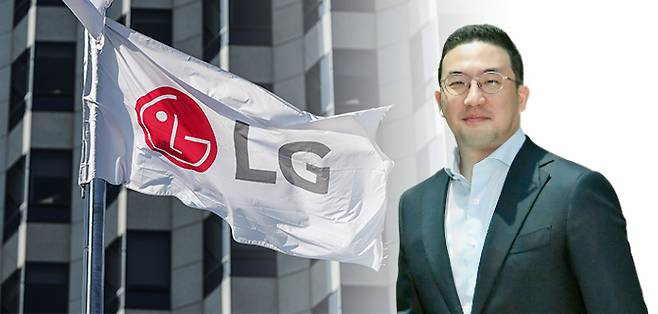LG now second most valuable biz group in Korea under Koo's leadership
이 글자크기로 변경됩니다.
(예시) 가장 빠른 뉴스가 있고 다양한 정보, 쌍방향 소통이 숨쉬는 다음뉴스를 만나보세요. 다음뉴스는 국내외 주요이슈와 실시간 속보, 문화생활 및 다양한 분야의 뉴스를 입체적으로 전달하고 있습니다.

As of Wednesday, the combined market cap of LG Group’s listed companies came to 241 trillion won ($201.5 billion), more than two times higher than 93.6 trillion won tallied on June 29, 2018, when the fourth-generation leader took office as chairman following death of his father and former LG Chairman Koo Bon-moo.
Since his inauguration at age 41, LG Group’s asset and revenue have also been swelled by 50 trillion won and 30 trillion won, respectively. LG Electronics, the flagship unit of the conglomerate, surpassed 70 trillion won in sales for the first time last year, while LG Display earned more than 2 trillion won in a dramatic turnaround from years of losses. Its electronics component unit LG Innotek reported 1.26 trillion won in operating profit over sales of 14.94 trillion won last year.
The strong performance of LG Group companies is largely owed to the groupwide business portfolio realignment into three strong pillar businesses of battery, OLED, and automotive electronics under Koo’s leadership that encourages the employees to keep challenging.
![[Photo by LG Energy Solution Ltd.]](https://img1.daumcdn.net/thumb/R658x0.q70/?fname=https://t1.daumcdn.net/news/202202/10/mk/20220210090006305gwny.jpg)
LGES, the second largest company in Korea by market cap that hits 119 trillion won, has a potential annual battery production of 1,230GWh, which can power about 1.6 million EVs. This is the world's largest level. The company aims to more than double its production capacity next year.
The group’s automotive electronics business led by LG Electronics is also in limelight for bold M&A and JV deals. LG Electronics made its first business buyout deal since Koo’s inauguration in 2018 by acquiring ZKW, an Austrian automotive lighting company.
In March last year, LG Electronics launched a car infotainment system JV named Alluto with DXC Luxoft, a DXC Technology company headquartered in Switzerland, and in July of the same year, it established an EV powertrain JV named LG Magna e-Powertrain with Canada-based Magna International, the No. 3 global player in the auto parts market, completing its car electronics business with infotainment (VS Division), powertrain (LG Magna), and automotive lamp (ZKW). The solid backlog of LG’s car electronics orders stands at 60 to 70 trillion won. The corresponding figure in its battery business is twice higher.
![[Photo by LG Electronics Inc.]](https://img2.daumcdn.net/thumb/R658x0.q70/?fname=https://t1.daumcdn.net/news/202202/10/mk/20220210090004178axcn.jpg)
“LG before Koo’s inauguration had conducted a deep dive into business fields it is good at, but the current LG throws away even what it has been good at and makes bold M&A moves in what it cannot do well to make it its own,” said Shin Dong-youb, Yonsei University’s business administration professor.
Since Koo took office, not a few business divisions have been jettisoned from LG. The withdrawal of mobile phone business in April last year is a case in point. LG Electronics also sold off its fuel cell and water treatment business. Other business assets chipped off from LG Group include LG Chem’s LCD polarizer, LG Display’s lighting OLED, and LG Uplus’ payment business.
[ⓒ Maeil Business Newspaper & mk.co.kr, All rights reserved]
Copyright © 매일경제 & mk.co.kr. 무단 전재, 재배포 및 AI학습 이용 금지
- Samsung Biologics sweeps 2022 CMO Leadership Award - Pulse by Maeil Business News Korea
- Google challenges Korean FTC at court for antitrust charges of ‘OS coercion’ in Korea - Pulse by Maeil Business News Korea
- Seoul to rule on account fraud charge on Celltrion as early as next month - Pulse by Maeil Business News Korea
- Neowiz reports 62% fall in ’21 OP, eyes rebound via blockchain, NFT-based content releases - Pulse by Maeil Business News Kore
- The presidential office kicks off study on candidates for next Bank of Korea governorship - Pulse by Maeil Business News Korea
- 강경준, 상간남 피소…사랑꾼 이미지 타격 [MK픽] - 스타투데이
- FI “1조 돌려달라”…정용진 ‘머니게임’ 毒 됐나
- 대만 치어리더 한국스포츠 첫 진출…K리그 수원FC - MK스포츠
- 이찬원, 이태원 참사에 "노래 못해요" 했다가 봉변 당했다 - 스타투데이
- 양희은·양희경 자매, 오늘(4일) 모친상 - 스타투데이